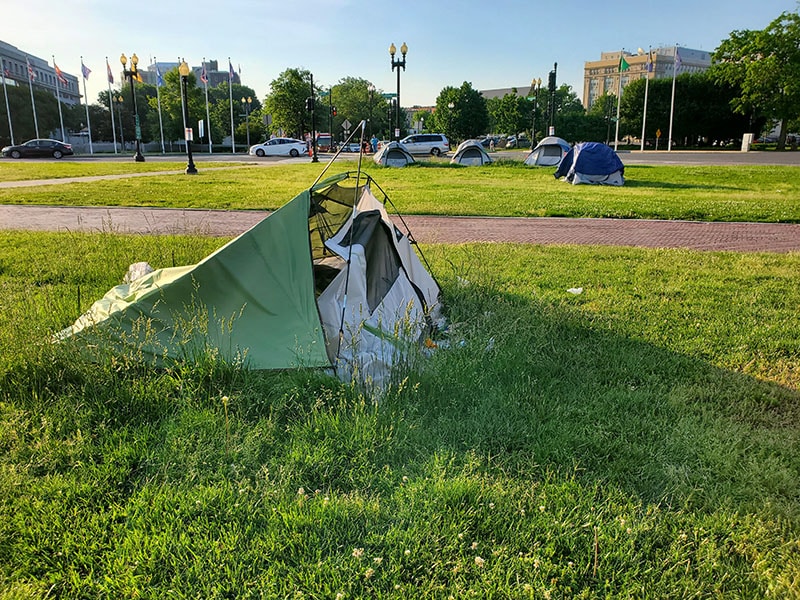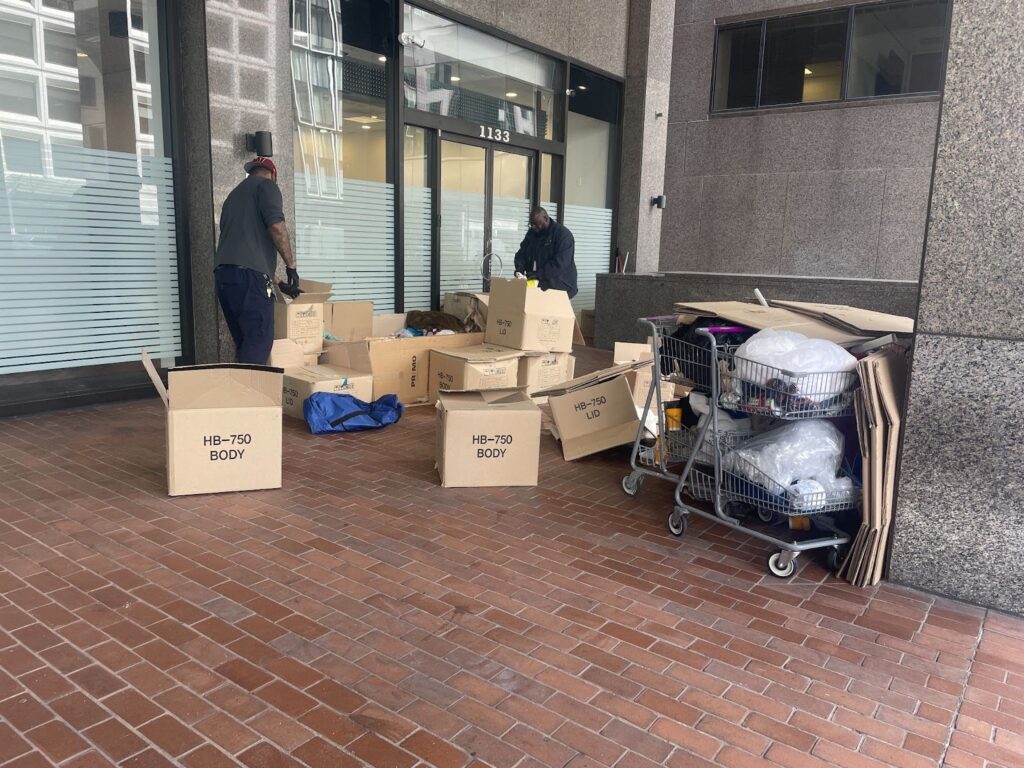Doug had a housing voucher, but he was still sleeping outside.
Three days after the Jan. 6 insurrection, he boarded a train to D.C. on the promise of a job. When he arrived, he learned his start date was delayed. The place he had expected to work was near the Capitol Building, which was fenced off by National Guard soldiers. For some time, he relied on his savings to pay for food and housing.
“Then, the job disappeared. COVID was still raging. And I kind of got stuck without any money, living on the streets,” he said.
Doug, who asked to be identified only by his first name because he fears retribution for speaking out about the District government’s housing process, had been living outdoors for a year and a half when Street Sense spoke to him in June. Though he recently received a Permanent Supportive Housing (PSH) voucher, he may still have months to wait before moving into an apartment.
Last summer, D.C. funded approximately 2,400 new individual PSH vouchers for fiscal year 2022, which started last October and runs through Sept. 30. The vouchers, which are split between regular PSH and emergency housing vouchers, provide long-term rent support and case management to people who have experienced homelessness for over a year and have a disabling condition. Many housing advocates view PSH vouchers as the best way to end chronic homelessness.
But three-quarters of the way through the fiscal year, only about 520 people have moved into housing through these vouchers so far, according to the Department of Human Services (DHS). Many more are waiting — over 1,000 are somewhere in the formal application process, and another 900 or so are waiting for the assistance they need to begin applying. DHS doesn’t expect to be able to house people with all 2,400 vouchers this year, according to Kevin Valentine, the agency’s communications director. This isn’t a new problem: D.C. used only 56% of newly available PSH vouchers between October 2019 and February 2021. But advocates say the current utilization rate is especially dismal and are urging reforms.
There were 2,400 more vouchers but few new staff members or systemic improvements in place to administer them. Once a person experiencing homelessness is deemed eligible for a voucher, they are assigned to a designated case manager at a nonprofit PSH service provider. Each case manager can take on only so many clients at once, limiting the number of vouchers the system can process. The case manager then helps the voucher holder submit an official application to the D.C. Housing Authority (DCHA), which then reviews the application. If the application is approved, the voucher holder — with the help of their case manager — has to find a unit to lease, have the unit inspected by DCHA, and sign a lease agreement. From the case manager assignment to lease up, the process takes 158 days on average, according to DHS.
“The pace of lease ups in FY22 is faster and reflects significant improvement compared to the pace of lease ups in FY21,” Valentine wrote in an email to Street Sense and The DC Line. “We are continuously focused on supporting each resident in the PSH program to attain quality housing as quickly as possible.”
As the end of the fiscal year approaches, PSH providers and housing advocates are demanding DCHA and DHS — which jointly administer the vouchers — speed up the process. They’re arguing that hiring incentives, streamlined application requirements, and a general decrease in bureaucracy would get people into housing faster.
The long wait can prove particularly harmful for voucher holders who have chronic illnesses and become more vulnerable each day they spend outside or in a shelter. In 2022, at least six people died in D.C. while waiting for a PSH unit, and case managers lost contact with 23, according to numbers presented by DHS to the Interagency Council on Homelessness.
“These are not just frustrating delays in paperwork — they are delays that are keeping people experiencing homelessness longer,” said Jesse Rabinowitz, senior manager of policy and advocacy at Miriam’s Kitchen, a local organization that administers PSH vouchers.
While Doug waited to move into his apartment, a green tent offered temporary accommodations. He was living outside of Union Station until the National Park Service evicted the 35 residents of the encampment. Spending his nights sweating during the heat of summer, he had to put the rest of his life on hold.
“Who’s gonna hire me? Living in a tent?” he asked. “You gotta shower every morning. … You’re dealing with the public, you have to present a certain way.”
1,533 people assigned
After Doug was deemed eligible for a voucher in the spring, he was assigned to a case manager at a nonprofit service provider to help him through the process.
Providers tried to quickly hire staff to handle the 2,400-voucher infusion. But doing so runs counter to the current labor market. Nationally, the unemployment rate is at a pandemic low of 3.6%, and the health care and social service sectors have the highest numbers of job openings.
Nearly every organization that contracts with the D.C. government to provide PSH vouchers has open positions. Adam Maier, the director of housing partnerships at Pathways to Housing, is asking everyone he meets whether they know someone who might want to work at Pathways.
“There aren’t enough people to fill the jobs that are available,” he said.
Providers also have to compete with DCHA and DHS, which often offer thousands more in salary when filling their own positions. The agencies also set minimum standards for the providers’ PSH staff members, including a bachelor’s degree. In order to expand the field of potentially qualified applicants, Maier has asked the government to lessen those requirements and consider some personal or professional experience with the voucher process as qualifying. DHS has worked with providers to increase some flexibility, Valentine said.
DHS also recently announced it will be adopting another approach recommended by advocates: incentives. The agency will fund hiring and retention bonuses for PSH provider staff, which Rabinowitz hopes will help them hire more workers. DHS has also hired 15 new staff members this year for the agency’s newly created permanent housing division, according to Valentine.
PSH is not just a housing program. It provides a range of services like basic health care, case management and therapy. The cost of these services will soon be covered by Medicaid, the government health insurance program for low-income adults and children as well as people with disabilities. While this will eventually save D.C. money, it complicates the PSH expansion process, said Christy Respress, executive director of Pathways. Providers will have new supervisor requirements, and some organizations may be hesitant to bring on more staff while billing systems are changing.
Meanwhile, about 900 people are waiting to be assigned to a case manager, according to DHS. With that kind of a backlog, several providers said they recognize the need to expand quickly. Sharlene Castle, director of operations at Jaydot, said everyone working to distribute PSH vouchers needs to remember it’s a crisis and act accordingly. “We should be doing as much as we can to solve it as quickly as possible,” she said.
839 people approved
Doug initially qualified for a PSH voucher through D.C.’s coordinated entry system, which determines whether a person experiencing homelessness is eligible for a permanent housing subsidy. After learning of his eligibility, a homeless services nonprofit assisted Doug with filing an application for a housing voucher.
Housing advocates see the process of preparing and filing the application as filled with unnecessary delays. It takes about 80 days to complete the document as applicants attempt to locate hard-to-access information. In some instances, it can be even longer: People experiencing homelessness are less likely to have access to a photo ID, and it can take up to a year to secure one in order to submit their application.
DCHA agreed in late June to waive the ID requirement for people who can’t easily access IDs. The D.C. Council approved emergency legislation on July 12 reiterating that people experiencing homelessness should not need IDs to obtain or keep a PSH voucher. The bill — which strengthened similar provisions included in last year’s Budget Support Act — also instructed DCHA to remove rules excluding people with criminal convictions from the PSH program.
This rule change is widely expected to speed up the application process. Many of the people Miriam’s Kitchen works with are waiting for IDs, according to Rabinowitz. But applications may still sit at DCHA for weeks; the agency has committed to processing all PSH applications within 20 days, but the average wait time is currently just over a month. About 120 people are currently waiting for approval from DCHA, according to DHS.
The application process doesn’t need to take so long, Maier said. For federal vouchers, Pathways is authorized to process applications itself, instead of sending them to DCHA.
“Right there is a transfer of paperwork and a review from a government agency that is not done by the federal government,” Maier said.
528 people housed
Affordable housing is always hard to find in D.C., Castle said, and some landlords make it hard for PSH holders to rent their units. In the long term, building more affordable housing could give voucher holders more opportunities to find housing, she said.
Maier is more concerned about one of the last steps in the process — the unit inspection. For vouchers funded by the federal government, Pathways can conduct the unit inspection itself. But for PSH vouchers, DCHA sends someone to the unit. This is one of the reasons it takes about 75 days for voucher holders to lease a unit even after their application is approved, Maier argued.
“When a landlord calls me and tells me an apartment can be inspected today, I will show up there in 24 hours. But with the local government, there’s a delay,” Maier said, noting that the housing authority has a 10-day target for performing its inspections.
923 vouchers left
While each step toward housing has its own challenges, providers identified several underlying factors that impede the overall process. It’s easy for applicants to feel lost in government bureaucracy, and different portals for landlords and voucher holders make it hard to keep up with all the required documentation. DCHA only updates online portals monthly, and case managers report not knowing the status of applications or who to contact at the agency.
Providers have offered solutions to this, including calls for a centralized portal. Maier said he’d also like to see case managers able to access daily updates on applications.
Since providers first raised these concerns in February, DCHA and DHS have been working to address them, Maier said. DCHA is reviewing how to make the voucher process more accessible and efficient, according to Sheila Lewis, agency director of communications.
Rabinowitz appreciates the discussions but said they haven’t yet cleared the bureaucratic roadblocks. “DCHA can’t keep operating the way they have been,” he said. “We’re so far behind track, and they need to be working in turbo mode to catch up.”
While the fiscal year ends in September, next year’s 500 new PSH vouchers for individuals won’t be available until Jan. 1, giving D.C. more time to house the remaining 1,900 individuals while spreading out the workflow for providers. Even if the process takes longer, the remaining vouchers will not expire. If all the vouchers from both years are used, advocates expect D.C. will be close to ending chronic homelessness for individuals in the city.
“We’ve got the money to do it,” Maier said. “We can get it done, presuming all the systems are in place.”
Will Schick contributed reporting.
This article was co-published with The DC Line.
Annemarie Cuccia covers DC government and public affairs through a partnership between Street Sense Media and The DC Line. This joint position was made possible by The Nash Foundation and individual contributors.








